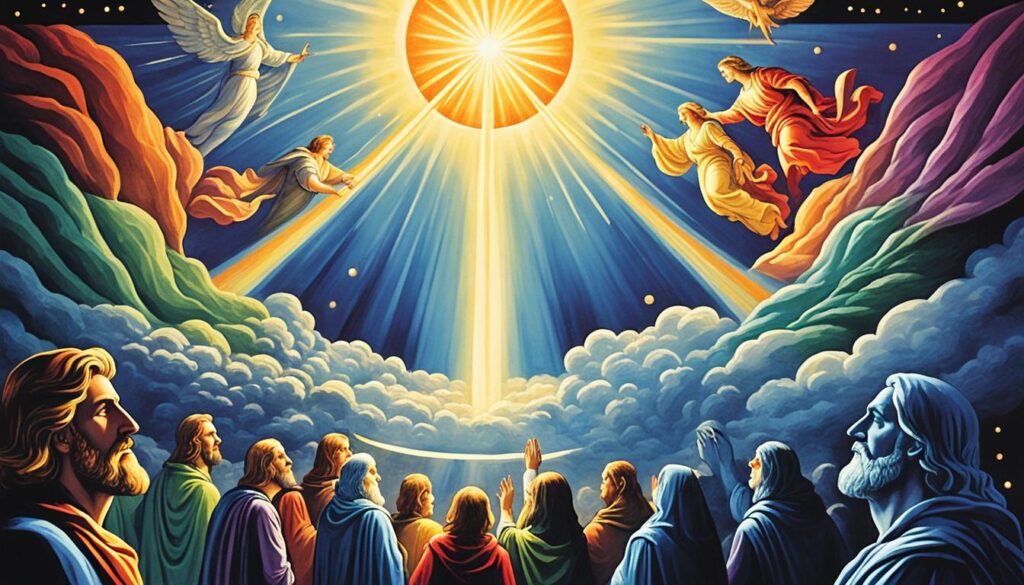Pt 2: Understanding Genesis: The Story of Creation
Have you ever gazed up at the night sky, in awe of the vastness of the universe? Have you marveled at the beauty and intricacy of the natural world around you? These profound experiences often lead us to ponder the origins of existence and the meaning behind it all. In our quest for understanding, we turn to the Genesis creation story, an ancient account that has shaped our understanding of the world and our place in it.
The Genesis creation story, found in the pages of the Bible, is a deeply symbolic and theological narrative that explores the origins of life and the purpose behind creation. It is not merely a scientific or historical account, but a profound expression of faith and belief. This ancient story has captivated the hearts and minds of people throughout history, sparking debates, inspiring art, and shaping worldviews.
In this article, we will embark on a journey of exploration into the rich symbolism and theological significance of the Genesis creation story. We will delve into the author’s interpretation of the creation narrative, the narrative style employed, the revelation of God within the story, and the theological implications for humanity’s relationship with the natural world. Together, we will uncover the layers of meaning contained within this ancient text and gain a deeper understanding of our own origins.
So, join us as we embark on this fascinating exploration into the Genesis creation story, a tale that transcends time and speaks directly to the depths of our souls.
Key Takeaways:
- The Genesis creation story is a deeply symbolic and theological narrative that explores the origins of life and the purpose behind creation.
- This ancient account has captivated hearts and minds throughout history, inspiring art, sparking debates, and shaping worldviews.
- In our exploration, we will uncover the author’s interpretation of the creation narrative, the narrative style employed, the revelation of God, and the theological implications for humanity.
- By delving into the Genesis creation story, we can gain a deeper understanding of our own origins and the meaning behind our existence.
- Join us on this fascinating journey as we unveil the layers of meaning and significance within the Genesis creation story.
The Origin of the Creation Story
The author of Genesis does not disclose the specific source of the creation story. Speculations include the possibility of the story being derived from an ancient oral tradition, an imaginative adaptation of ancient written accounts such as the Babylonian creation story, or a special revelation from God.
Regardless of the source, ancient Jewish and Christian believers have embraced the story as Scripture, and the other biblical authors have incorporated elements of the creation narrative into their own writings. It is important for us to focus on what the biblical authors have written rather than speculating about what they may have omitted.
The origins of the creation story in Genesis have been a subject of much debate and interpretation. Some scholars propose that the story may have originated from ancient oral traditions, passed down from generation to generation before being written down. This theory suggests that the creation story in Genesis reflects the ancient worldview and beliefs of the Israelite people.
“The origin of the creation story has long been a source of fascination and intrigue. While we may never know the exact origin, it is clear that the story has deep roots in ancient tradition.”
Others argue that the creation story in Genesis may be an adaptation of ancient written accounts from neighboring cultures, such as the Babylonian creation myth. Similarities between the two stories, such as the use of divine beings and the order in which the world is created, have led some scholars to propose the idea of cultural influence and adaptation.
Finally, some believers view the creation story as a special revelation from God, directly inspired and communicated to the author of Genesis. They see the story as a divine expression of God’s creative power and intention for the world.
While the exact origin of the creation story remains a mystery, its significance and impact on ancient Jewish and Christian communities cannot be denied. Regardless of its source, the creation story in Genesis holds profound theological and spiritual truths that continue to inspire and shape our understanding of God’s work in the world.
The Symbolism and Style of the Creation Story
The creation story in Genesis 1 is a powerful account filled with symbolism and brought to life through a distinct narrative style. It begins by depicting the world in a state of chaos and disorder, emphasizing the need for divine intervention. As God’s creative acts unfold, order is gradually established, and life emerges from the formless void. This story’s symbolic portrayal highlights the transformative power of God’s hand in shaping the world.
One fascinating aspect of the creation story is the use of special words and numbers to convey deeper meaning. For example, the Hebrew word “ruakh” is employed to describe God’s spirit in the creation account. This word is not limited to this context alone; it appears in other biblical passages, linking the creative force of God to His ongoing work in the world. Additionally, the repetition of the phrase “and there was evening and morning” after each day of creation signifies the completion and perfection of each stage.
Symbolism: Unformed Chaos and Transformative Order
The story of creation in Genesis 1 portrays the world in its unformed and unfilled state, emphasizing chaos and disorder. This symbolic portrayal invites readers to recognize the transformative power of God’s creative acts, as chaos gives way to order and life. By utilizing this symbolism, the creation story highlights the divine authority to bring purpose and structure to our lives and the world around us.
These symbolic elements of Genesis 1’s narrative style serve as invitations for readers to contemplate the profound messages embedded within the creation story. They prompt us to explore the interconnectedness of different elements and the divine hand guiding the process. Through this symbolism and narrative style, the creation story taps into our collective imagination and sets the stage for the theological journey to unfold.

For a deeper exploration of the symbolism of creation stories across cultures, you may find it helpful to visit this page on Britannica. Additionally, Wikipedia provides valuable insights into the narrative style of the Genesis creation account.
The Theological Significance of Creation
The creation story in Genesis is not merely a historical account of how the world came into being; it holds profound theological significance that shapes our understanding of God, humanity, and the purpose of creation itself.
Unlike the belief in evolution and naturalistic origins, biblical creation is rooted in a theological framework that acknowledges the existence of a Creator God. It affirms that the universe and all life within it were intentionally brought into existence by this supreme being.
This belief in biblical creation is based on several presuppositions that guide our understanding of the world. It emphasizes the Bible as the authoritative source of information about creation, rejecting the idea that the world came about through random chance or an impersonal natural process over billions of years.
From a biblical perspective, creation is not a random occurrence; it is purposeful and intentional. Humanity, as part of this created order, holds a unique role as both created in the image of God and entrusted with the responsibility of stewarding and ruling over creation. Understanding the theological significance of creation helps us reconcile the biblical account with alternative perspectives and comprehend the purpose behind God’s creative work.
To explore further the theological significance of creation, you can read more on this topic from these resources: Theology of Work and Ministry Magazine.







